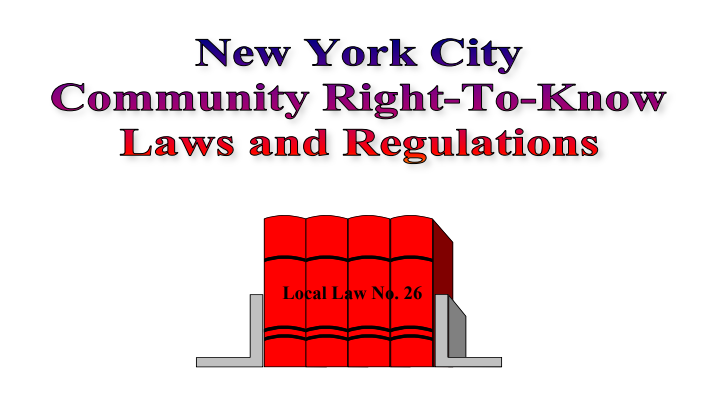You realized you missed the Right-to-Know (RTK) filing deadline of March 1st and did not submit an annual Hazardous Chemical Inventory Tier II Report to the New York City (NYC) Department of Environmental Protection (DEP) for your Facility. Now what should you do? Should you file late? Wait until next year? Is it possible you do not have to file at all?
Should You Still File Now that you are Late?
If you do not file, you may receive a late filing violation, whether through an inspection, or in the mail. A first violation in New York City means you pay a penalty, AND then you typically will be given no more than 30 days to correct the violation by STILL submitting the Right-to- Know filing for your Facility. If the Right-to-Know filing is not completed within the agreed time, a second violation will be issued, as well as any subsequent violations, until the Facility has submitted a Facility Inventory Form (FIF) with all necessary documentation for completion of the required Tier II reporting.
It should be noted that second or subsequent violations may also apply if you filed late one year and then have a repeat of a late or missed filing in a following year. Second and subsequent violations may result in being required to attend a hearing, which will also cost you your time in addition to the penalties you need to pay.
Do not wait! Get your Right-to-Know filing completed and submitted as soon as you can (and whenever possible, on time).

How much does a Violation Cost Me?
In New York City, failure to submit your RTK Facility Inventory Form (FIF) with all accompanying documents to the NYC DEP may result in violation penalties ranging from $250 – $10,000 or time spent in jail.
The NYC DEP may issue fines for failure to file Right-to-Know reports on time in the following dollar amounts [as per Local Law #26 Chapter 7 (24-713)]:
- First Violation: $250 – $2,500
- Second Violation: $1700
- Subsequent Violations: $3,750 – $10,000
How Do I Know if my Facility Needs to File?
A Facility is required to file if the weight number of hazardous substances stored at said Facility is at or exceeds the reporting thresholds set by NYC law. Many hazardous substances may need to be reported, even in small quantities, based on the reporting thresholds and their potential danger to employees and the public.
Examples of Facilities that are required to file with the NYC DEP under the Community Right-to-Know Law include:
- Industrial and Manufacturing Facilities
- Dry Cleaning and Laundromat Facilities
- Automotive Repair Facilities, Car Dealerships, Service Stations and Auto Body Shops
- Nursing Homes and Rehabilitation Centers
- Hotels and Commercial Hospitality Businesses
- Funeral Homes and Printing Facilities
- Bulk Supply Stores
- Research and Analytical Laboratories
- Other Businesses that House Hazardous Substances
If you operate a Facility that uses or stores any of the substances listed below, you may be required to file:
- Petroleum products (Diesel, Gasoline, Motor Oil), Brake Fluid, Antifreeze
- Lubricants, Grease, Degreasers
- Paints, Paint Thinners, Lacquers, Dyes
- Cleaning Supplies, Bleach, Wax, Solvents, Detergents
- Aerosols, Air Fresheners, Disinfectants, Insect Repellants
- Batteries, Fertilizers, Preservatives, Lead welding rods
- Compressed Gas Cylinders
Let Us Help
Walden has been performing Right-to-Know filings for clients for 25 years. If you have forgotten to file or recently received a violation, let Walden help resolve the issue through a speedy inspection and submittal. Walden can coordinate with the regulatory agency on your behalf. Prompt action develops good faith with the regulatory agency and might result in more lenient fines.
Questions?
If you have any questions regarding your chemical inventory, DEP compliance, or RTK Tier II filing, check out our Right-to-Know webpage and contact Walden Environmental Engineering.
